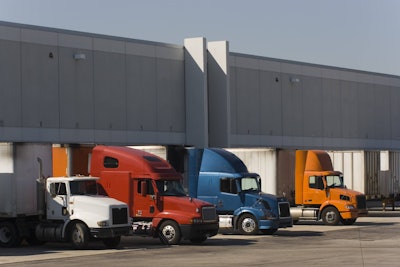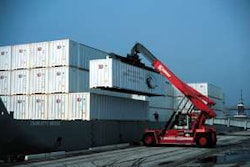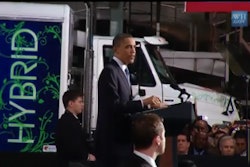
Truckload capacity shortages will gather momentum this year and continue through 2013 as the economy recovers and regulatory restrictions will limit the driver pool, an FTR Associates economist said Wednesday, April 6, in an online seminar.
FTR senior consultant Noel Perry estimated that because of the economic upturn and the federal government’s push for improved safety, “a couple hundred thousand drivers will be taken out of the marketplace between now and the end of next year.” He acknowledged that forecast shortages have been slow to occur and now likely will hit the market in 2012.
Perry said trucking is typically slow to respond to an economic recovery, and that if the market doesn’t respond by ordering more equipment to improve productivity, “There will be a bunch of loads that don’t get delivered. That means there will be supply chain failures,” although he does expect the industry to meet the challenge.
To date, truckload rate increases haven’t materialized as anticipated, Perry said, because the industry achieved productivity gains last year, which enabled companies to absorb additional freight without adding equipment and drivers. That period has passed, and the market has tightened.
“We expect the rest of the year to have relatively strong truck shortages to include price increases,” he said. Perry predicted that prices will continue to rise through next year and into 2013 even as trucking capacity catches up with demand. Perry added that truck tonnage will average 5 percent growth this year through 2013.
Preliminary FTR data shows March Class 8 truck net orders for all major North American OEMs totaled 28,871, a 20 percent increase over February preliminary orders and a 155 percent increase over the same period in 2010. FTR said the March results – which includes the United States, Canada, Mexico and exports – are a continuation of the strong trend from previous months.
FTR recently increased its 2011 projections for Class 8 truck sales and said that the strong order activity in March 2011 supported that decision. Perry said the current strong new truck orders primarily are to replace aging equipment and not adding to capacity. However, he said if his forecast of higher rates is accurate, he anticipates a “considerable expansion by the industry in 2012 and 2013.”
On another question, the FTR economist said he hadn’t factored in proposed weight-limit increases in calculating productivity gains. But, he said, if allowed weights are increased to 97,000 pounds, it would wipe out the driver shortage he’s attributing to regulatory restrictions. “Size and weight is a big deal and has major productivity implications,” Perry said.
Perry predicts 3.5 percent gross domestic product growth this year. He said the continuing decline in homeownership will have a negative impact on the overall economy and trucking. He said he’s “fairly pessimistic” about housing’s long-term effect on trucking this decade.
Perry said the Japan earthquake will have a modest downward impact on the U.S. economy for a couple of months before the economy recovers in the summer as Japan rebuilds. High oil costs also are felt by businesses, but they “won’t kill the economy,” Perry said. The wild card is if political unrest in the Middle East spreads to Saudi Arabia. “That will be a big deal,” he said.











